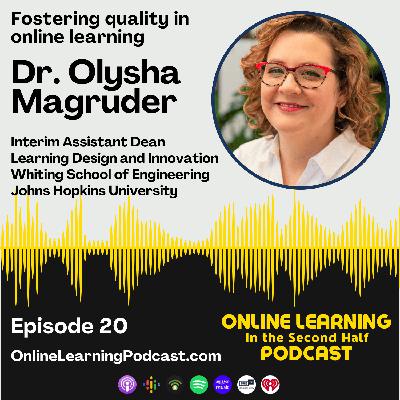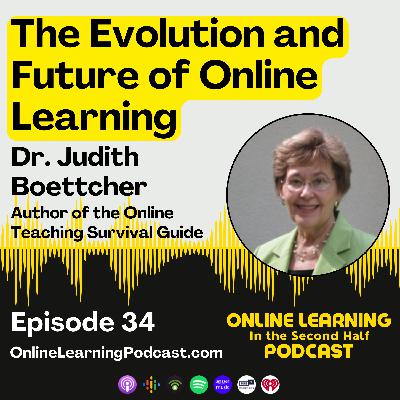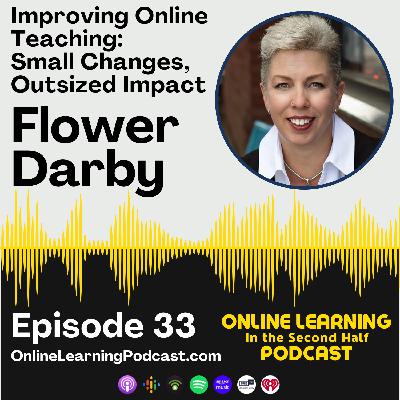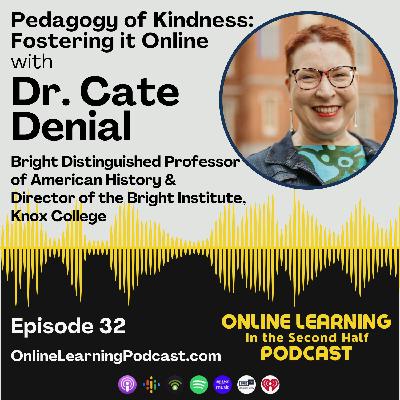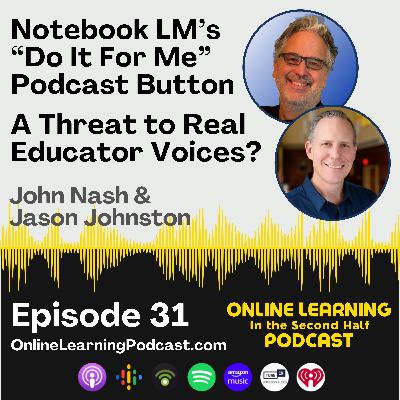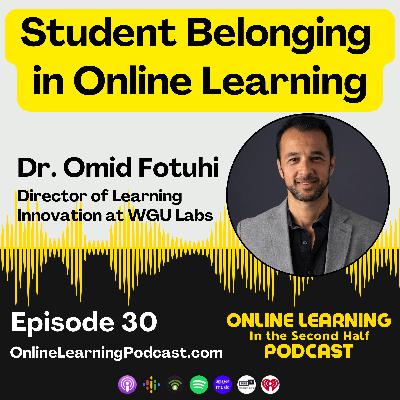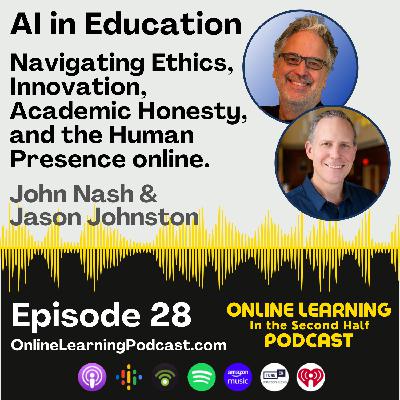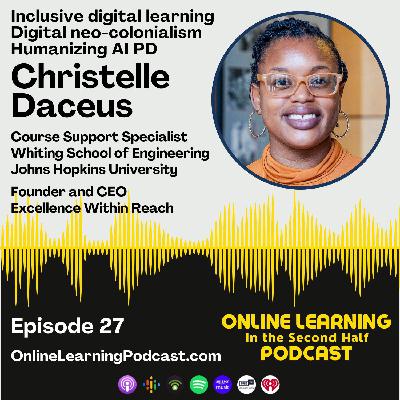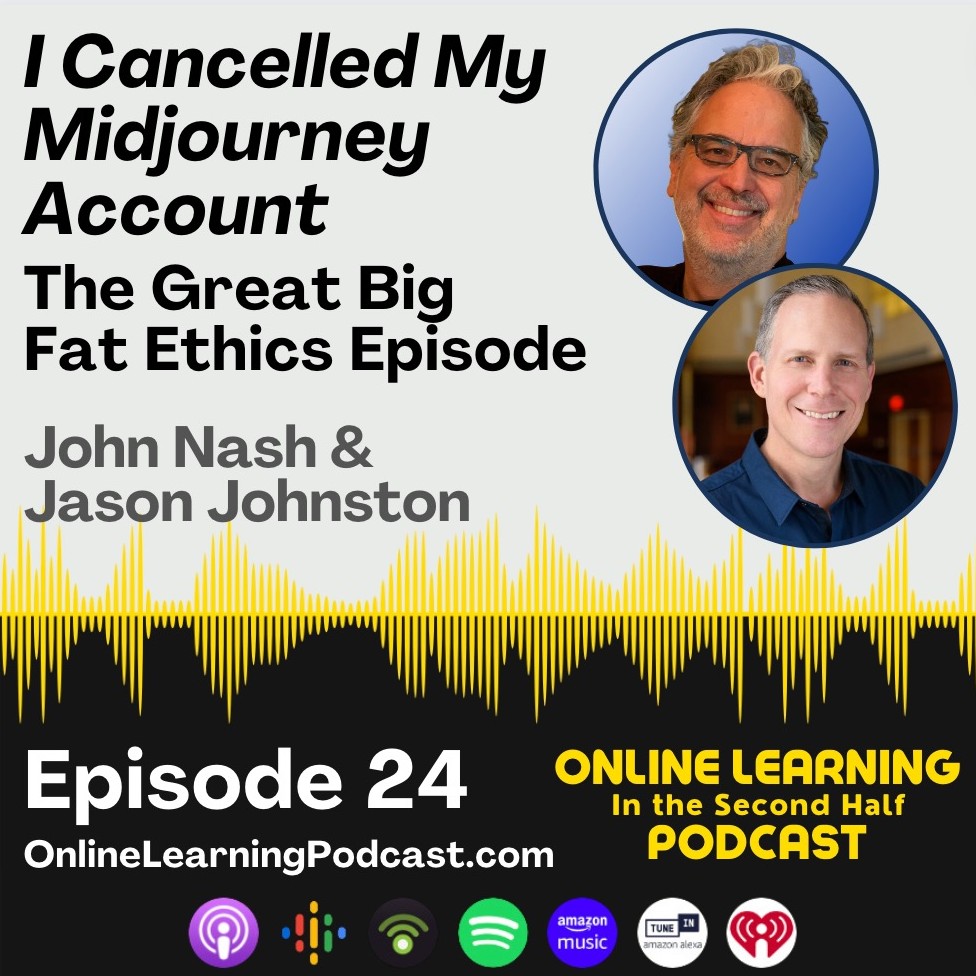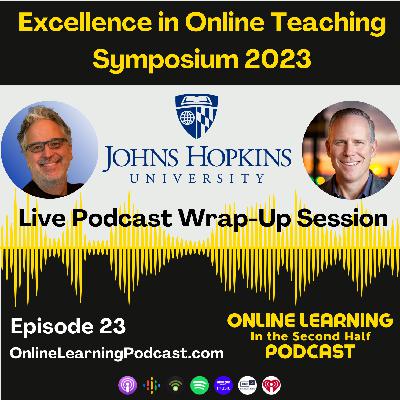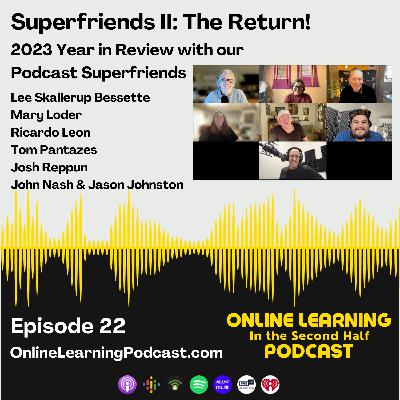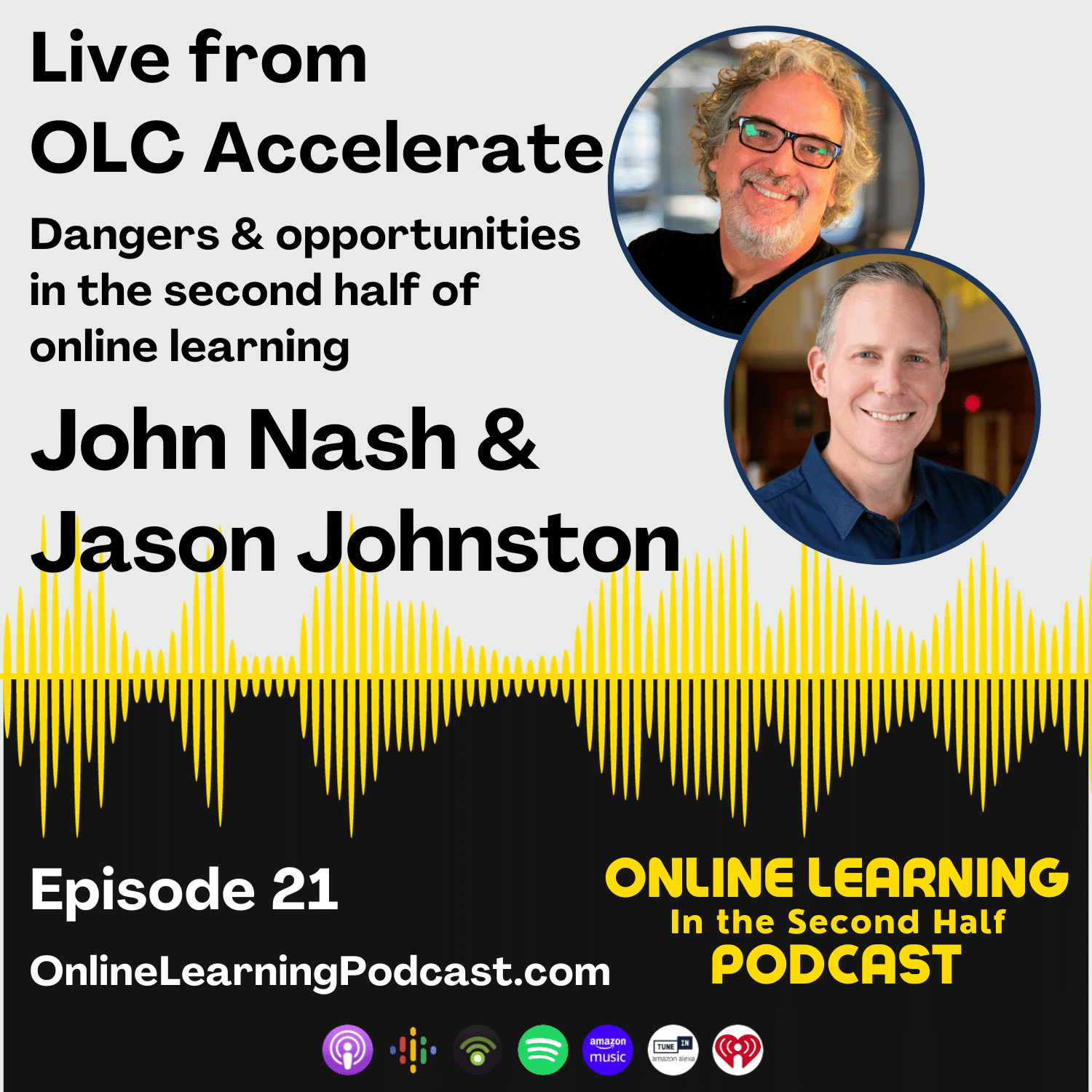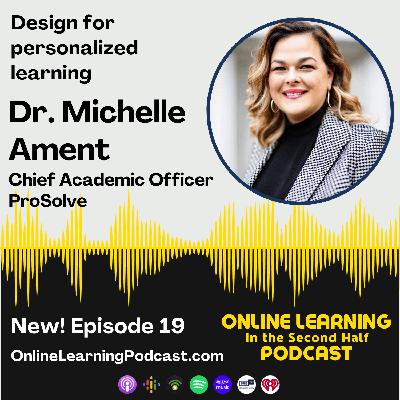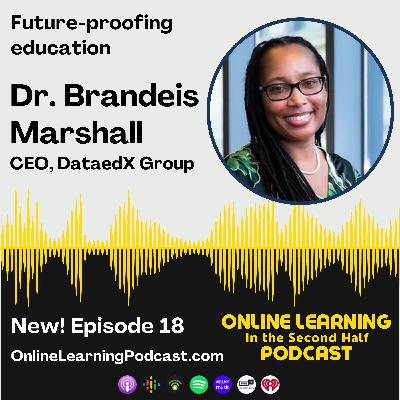EP 20 - Dr. Olysha Magruder from Johns Hopkins talks about their three-pronged approach to online faculty development
Description
In this episode, John and Jason talk with Dr. Olysha Magruder about the future of online education, a three-pronged approach to faculty development including JHU’s Coursera MOOC Course, and time boxing to help achieve successful outcomes. See complete notes and transcripts at www.onlinelearningpodcast.com
Join Our LinkedIn Group - *Online Learning Podcast (Also feel free to connect with John and Jason at LinkedIn too)*
Links and Resources:
- Dr. Olysha Magruder is the Interim Assistant Dean in the Center for Learning Design at Johns Hopkins University and can be found here at LinkedIn
- Excellence in Online Teaching Coursera Course
- Johns Hopkins Excellence in Online Teaching Symposium
- Beth McMurtrie on Teaching: What happens to teaching after Covid? (Chronicle of Higher Ed Paywall)
Theme Music: Pumped by RoccoW is licensed under a Attribution-NonCommercial License.
Transcript
We use a combination of computer-generated transcriptions and human editing. Please check with the recorded file before quoting anything. Please check with us if you have any questions!
False Start
[00:00:00 ] Jason Johnston: Any other questions for us before we get rolling? We'll do our normal kind of intro here, and then we'll get into the conversation.
[00:00:07 ] Olysha Magruder: No, no questions. I hope I don't sound too goofy, but...
[00:00:10 ] John Nash: No, we like goofy.
[00:00:11 ] Jason Johnston: Yeah, you'll fit right in! . We decided on the front end. We're just going to let it roll in that way. And I feel like john people have appreciated that
[00:00:18 ] John Nash: I even laugh at our own dumb intros because it's just, but yeah, we're not too stiff about it, but we have a serious topic here, but yeah, we're still humans.
Start of Episode
[00:00:27 ] John Nash: I'm John Nash here with Jason Johnston.
[00:00:30 ] Jason Johnston: Hey, John. Hey, everyone. And this is online learning in the second half, the online learning podcast.
[00:00:35 ] John Nash: Yeah, we're doing this podcast to let you in on a conversation we've been having for the last two years about online education. Look, online learning's had its chance to be great, and some of it is, but a lot still isn't. How are we going to get to the next stage, Jason?
[00:00:49 ] Jason Johnston: That is a great question. How about we do a podcast and talk about it?
[00:00:54 ] John Nash: I agree. Let's do a podcast and talk about it right now. What do you want to talk about today?
[00:01:00 ] Jason Johnston: Wait, we are doing a podcast to talk about it. That's the weird thing about our intro. We're already doing a podcast
[00:01:05 ] John Nash: Yeah. It's very meta.
[00:01:07 ] Jason Johnston: a little meta that way. Yeah. Yeah today we are going to talk with Alicia Magruder. Dr. Alicia Magruder from John Hopkins Whiting School of Engineering.
[00:01:22 ] Olysha Magruder: Hello, Alicia here.
[00:01:25 ] Jason Johnston: Did I say all that right?
[00:01:27 ] Olysha Magruder: tHere is one funny thing about the name of my university, which is it's named after somebody. who has a weird first name, and it's Johns. That was his name. It's very common to say John because it feels weird to say Johns, and in fact, when I originally applied for my position in my cover letter, I also said John.
[00:01:47 ] Jason Johnston: Oh boy.
[00:01:48 ] Olysha Magruder: I learned very quickly that, oops, it's a weird name, Johns Hopkins, but everything else, yes.
[00:01:53 ] Jason Johnston: I'm glad you, you made it through that first that first test and they were kind to you, somebody not too long ago spelled Tennessee wrong on a cover letter, hard one to look over, easy to do though, easy to do, but also a little hard to look over sometimes.
Yeah nice to have you here. So Johns Hopkins Whiting School of Engineering.
[00:02:14 ] Olysha Magruder: Yes, that's right. Whiting School of Engineering.
[00:02:17 ] Jason Johnston: Yeah. And tell us about what you do there.
[00:02:21 ] Olysha Magruder: So I am the interim assistant dean of learning design and innovation, which is a somewhat new position not on the team, but for me, but I lead the learning design team of instructional designers and course support specialists. And we work collaboratively with our multimedia and instructional technology team to create online courses.
So we have our main program that we I guess we could say service is a engineering for professionals program and there are 22 online master's degrees that we help support. So we run hundreds of courses at any given time. We have right now we have about 130 plus courses in development with our instructional designers and yeah, that's what we do.
[00:03:09 ] Jason Johnston: Yeah. That's exciting. You've got a lot going on there though with with a hundred plus
[00:03:15 ] Olysha Magruder: Yeah,
[00:03:15 ] Jason Johnston: Does it feel like a lot?
[00:03:18 ] Olysha Magruder: it does, but we've structured our team so that it's very collaborative amongst our instructional designers, faculty, the multimedia folks, the course support specialists. So we have what we call pods of team members and they work together for certain programs. And that way they can. Discuss the program specific needs, but because of that, we have a very nice workflow that we've created.
So it is a lot, but it's manageable. So far. I haven't had any anybody tell me that they're ready to put their hands up in frustration. That happens occasionally, we get through it.
[00:03:53 ] Jason Johnston: Yeah.
[00:03:55 ] John Nash: Alicia, does every program that you just mentioned receive the benefits of your services or do some just still go on their own?
[00:04:02 ] Olysha Magruder: They all go through us to create their courses. There are some, a couple of programs that have a slightly different approach that we accommodate, but eventually they end up with us. So everything that goes online through those master's programs through that one engineering for professionals is all the courses go through us at some point and we have a the course support specialists.
We also have a quality assurance manager. They make sure everything is like accessible and, we have all these quality checks throughout the process. So that's by design. So all of those courses are vetted, reviewed, et cetera.
[00:04:41 ] John Nash: That's wonderful. I know at my institution, there are online programs that do the best they can, and we have folks that can help us, but it's not as systematic as that.
[00:04:52 ] Olysha Magruder: Yeah, we are somewhat unique and a part of that is because these big online programs, most of the faculty are by design people in the field. So they're super busy people and they're incredible people. It's pretty cool working with people who work at NASA or worked on the, asteroid destruction mission or are doing biomedical engineering things that you see on LinkedIn .
And I don't even know half the time what they're working on, but then I see these posts and I'm like, whoa, they're like revolutionizing the medical field and. So they're super busy people, and so we've designed this to work with that particular type of person, and it's a longer, it's a very, it's a committed process, and it's a longer term process, but it works, mostly.
[00:05:39 ] John Nash: Nice.
[00:05:40 ] Jason Johnston: If we ever wondered whether or not online learning was important we now know that it is because we're training up the next people that will actually stop that asteroid from hitting the earth, right? The current people that know how to save us aren't going to be alive when the asteroids hit. So we're online learning is essential for training up the next generation.
[00:06:02 ] Olysha Magruder: We actually had , one of the mission coordinator for the DART mission speak at it at a recent event, I don't think she teaches for us, but she's affiliated with one of our units. Anyways, she gave the whole awesome session on the DART mission, which was the asteroid deflection mission.
She reassured everyone that it's very rare that's going to happen, that we have an asteroid that will hit that, We'll destroy the earth or what have you, but some of the statistics you put up there, she seemed reassured by, but I was like, oh my gosh, I don't feel good about these numbers.
I know she does, but they still as any number seems a little bit,
[00:06:38 ] Jason Johnston: right? If it's not zero, it still feels like something that could happen.
[00:06:42 ] Olysha Magruder: Exactly,
[00:06:43 ] Jason Johnston: Willis
When you need them too, right? Because I, he's not going to be saving us. That's an Armageddon reference. I don't know if you've seen it. Have you seen that one, John
[00:06:50 ] John Nash: I have years ago, 80s or 90s, I think. Yeah, but yeah,
[00:06:55 ] Olysha Magruder: I'll have to look for it. I don't think I've seen it.
[00:06:58 ] Jason Johnston: Yeah. It's an action movie where they're the ones that are skilled and determined to, to take care of this asteroid before

